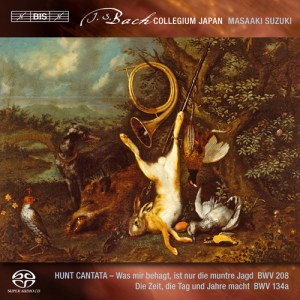 |
 |
|


alternatively
CD: MDT
AmazonUK
AmazonUS
Download
from eClassical |
Johann Sebastian BACH
(1685-1759)
Secular Cantatas Vol. 2
Sinfonia in F major, BWV 1046a/1 [4:00]
Was mir behagt, ist nur die Muntre Jagd, BWV 208 [34:52]
Die Zeit, die Tag und Jahre Macht, BWV 134a [34:56]
 Joanne Lunn (soprano); Sophie Junker (soprano); Damien Guillon (alto);
Makoto Sakurada (tenor); Roderick Williams (bass)
Joanne Lunn (soprano); Sophie Junker (soprano); Damien Guillon (alto);
Makoto Sakurada (tenor); Roderick Williams (bass)
Bach Collegium Japan/Masaaki Suzuki
rec. July 2011, MS&AD Shirakawa Hall, Nagoya, Japan.
 BIS BIS-SACD-1971
BIS BIS-SACD-1971  [74:40]
[74:40]
|
|
|
The goddess Diana spurns the ravishingly handsome Endymion in
favour of praising the great hunter, Duke Christian, whose birthday
it is. It could be the basis for the next Hollywood block buster,
but is in fact the plot of Bach’s Was mir behagt, ist
nur die Muntre Jagd (known as the Hunt Cantata)“The
cheerful hunt is all that gives me pleasure.” The piece
was written in 1713 for Duke Christian of Saxe-Weisenfels and
was first performed on the Duke’s birthday. The subsequent
plot of the cantata, which was semi-staged with props, is given
over to unashamed praise of the Duke and all his qualities.
The most well-known movement, Sheep may safely graze
(track 10), is used to praise the Duke’s gentle and fatherly
characteristics. The scoring of the work is dramatic and imaginative
- Diana’s entry is heralded by hunting horns; Pales is
accompanied by recorders which are associated with shepherds;
and Pan’s first aria is introduced by a trio of oboes.
This disc has been eagerly anticipated after the success of
volume 1 and does not disappoint. The soloists are perfectly
balanced by the orchestra at all times. Particular highlights
are the duet between Joanne Lunn and Makoto Sakurada in (track
13) where the vocal quality of the pair are well matched and
the subtlety of the phrasing of the instrumental parts compliment
the larger gestures from the singers. The soloists are joined
by further singers for the chorus Lebe, Sonne Diesen Erden
(Live, sun of this earth) which is fugal in structure and contains
the most enjoyable instrumental writing. The hunting horns blend
perfectly with the other more usual instruments and the overall
effective is of drive and excitement. There are so many recordings
of the Hunt Cantata and it is difficult to compare the
sublime soprano sounds of Emma Kirkby (The Parley of instruments/Roy
Goodman, Peter Holman, Hyperion CDA66169) to the much richer
tones of Joanne Lunn but this recording is a worthy addition
to anyone’s CD rack.
The other cantata on the disc, Die Zeit, die Tag und Jahre
Macht (Time, Maker of days and years), was written during
Bach’s time in the service of Prince Leopold of Anhalt-Köthen
for New Year’s Day. The allegorical characters Time and
Divine Providence compete to present the past and future of
the Prince’s reign in the most flattering light. Once
again, Bach’s instrumentation complements the text he
is using, for example the scoring in Aria 4, a duet between
the soloists. The text refers to the “strings of the heart”
and the accompaniment is provided solely by the string section.
Once again the performance is flawless. The purity of tone of
alto soloist Damien Guillon is matched in richness and expression
by the full-toned voice of Roderick Williams. Particularly in
the duet mentioned above, the pair makes use of the rivalry
between their characters to compete for the most virtuosic singing
which truly brings the music to life. The final chorus is elegantly
paced and showcases the delicate but assured playing of the
orchestra. The chorus almost match the subtlety of phrasing
that the soloists achieve, and this movement provides a lusty
and accomplished ending to this rather special CD.
The recording opens with the Sinfonia from the early
version of the first Brandenburg Concerto. Suzuki explains
in the liner notes, that the scoring of this movement is the
same as the Hunt Cantata and may well have been performed
at the same time. The performance of this movement is equally
as good as the playing in the cantatas, except that occasionally
the horns don’t blend in the overall texture as well as
they could do.
Overall, this is a pleasing sequel to the first volume of Bach’s
secular cantatas (see review),
with extremely able soloists and instrumentalists who are capable
of great delicacy of phrasing and who are a joy to listen to.
Hannah Parry-Ridout
Reviews
of Bach Collegium Japan recordings on BIS
|
|




 All Nimbus reviews
All Nimbus reviews








